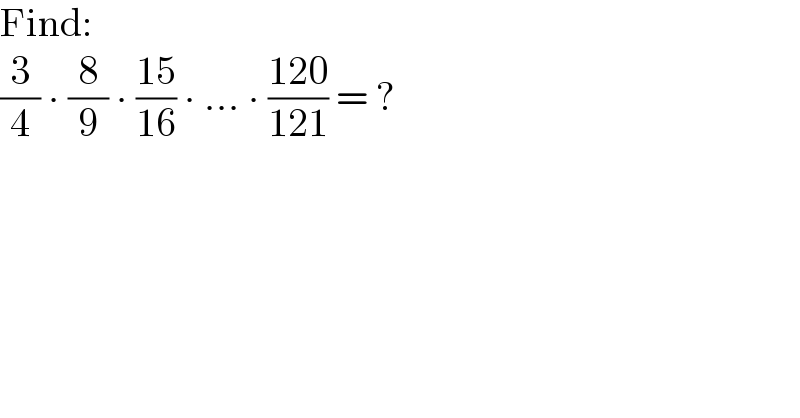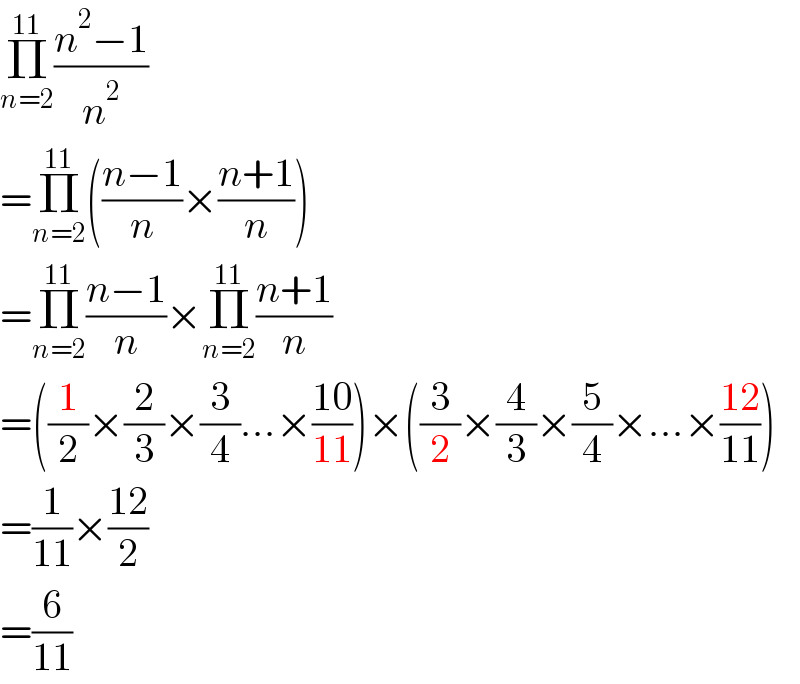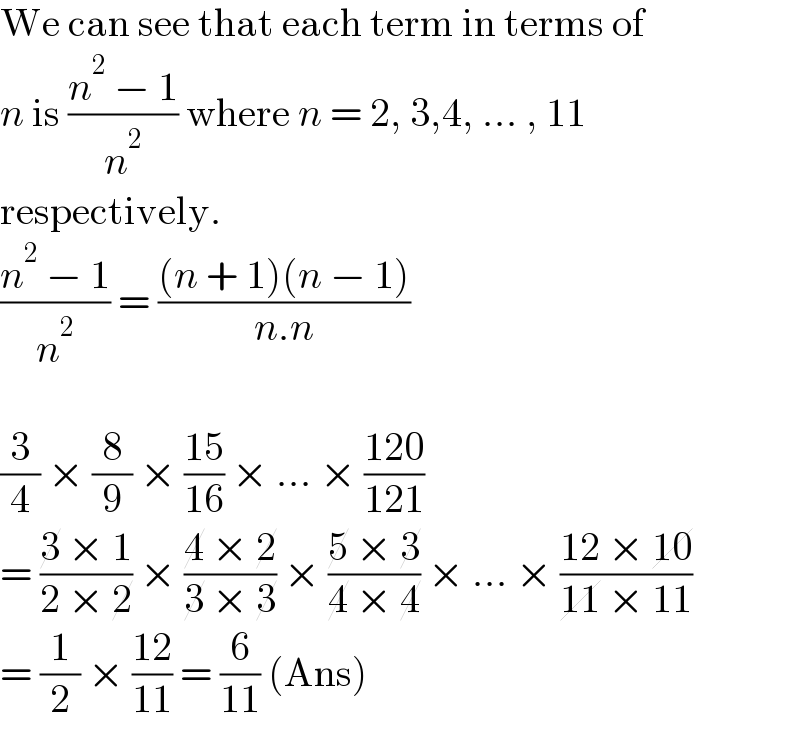
Question Number 206066 by hardmath last updated on 06/Apr/24

$$\mathrm{Find}: \\ $$$$\frac{\mathrm{3}}{\mathrm{4}}\:\centerdot\:\frac{\mathrm{8}}{\mathrm{9}}\:\centerdot\:\frac{\mathrm{15}}{\mathrm{16}}\:\centerdot\:...\:\centerdot\:\frac{\mathrm{120}}{\mathrm{121}}\:=\:? \\ $$
Answered by mr W last updated on 06/Apr/24

$$\underset{{n}=\mathrm{2}} {\overset{\mathrm{11}} {\prod}}\frac{{n}^{\mathrm{2}} −\mathrm{1}}{{n}^{\mathrm{2}} } \\ $$$$=\underset{{n}=\mathrm{2}} {\overset{\mathrm{11}} {\prod}}\left(\frac{{n}−\mathrm{1}}{{n}}×\frac{{n}+\mathrm{1}}{{n}}\right) \\ $$$$=\underset{{n}=\mathrm{2}} {\overset{\mathrm{11}} {\prod}}\frac{{n}−\mathrm{1}}{{n}}×\underset{{n}=\mathrm{2}} {\overset{\mathrm{11}} {\prod}}\frac{{n}+\mathrm{1}}{{n}} \\ $$$$=\left(\frac{\mathrm{1}}{\mathrm{2}}×\frac{\mathrm{2}}{\mathrm{3}}×\frac{\mathrm{3}}{\mathrm{4}}...×\frac{\mathrm{10}}{\mathrm{11}}\right)×\left(\frac{\mathrm{3}}{\mathrm{2}}×\frac{\mathrm{4}}{\mathrm{3}}×\frac{\mathrm{5}}{\mathrm{4}}×...×\frac{\mathrm{12}}{\mathrm{11}}\right) \\ $$$$=\frac{\mathrm{1}}{\mathrm{11}}×\frac{\mathrm{12}}{\mathrm{2}} \\ $$$$=\frac{\mathrm{6}}{\mathrm{11}} \\ $$
Commented by hardmath last updated on 06/Apr/24

$$\mathrm{cool}\:\mathrm{dear}\:\mathrm{professor}\:\mathrm{thankyou} \\ $$
Answered by MATHEMATICSAM last updated on 06/Apr/24

$$\mathrm{We}\:\mathrm{can}\:\mathrm{see}\:\mathrm{that}\:\mathrm{each}\:\mathrm{term}\:\mathrm{in}\:\mathrm{terms}\:\mathrm{of} \\ $$$${n}\:\mathrm{is}\:\frac{{n}^{\mathrm{2}} \:−\:\mathrm{1}}{{n}^{\mathrm{2}} }\:\mathrm{where}\:{n}\:=\:\mathrm{2},\:\mathrm{3},\mathrm{4},\:...\:,\:\mathrm{11}\: \\ $$$$\mathrm{respectively}. \\ $$$$\frac{{n}^{\mathrm{2}} \:−\:\mathrm{1}}{{n}^{\mathrm{2}} }\:=\:\frac{\left({n}\:+\:\mathrm{1}\right)\left({n}\:−\:\mathrm{1}\right)}{{n}.{n}}\: \\ $$$$ \\ $$$$\frac{\mathrm{3}}{\mathrm{4}}\:×\:\frac{\mathrm{8}}{\mathrm{9}}\:×\:\frac{\mathrm{15}}{\mathrm{16}}\:×\:...\:×\:\frac{\mathrm{120}}{\mathrm{121}} \\ $$$$=\:\frac{\cancel{\mathrm{3}}\:×\:\mathrm{1}}{\mathrm{2}\:×\:\cancel{\mathrm{2}}}\:×\:\frac{\cancel{\mathrm{4}}\:×\:\cancel{\mathrm{2}}}{\cancel{\mathrm{3}}\:×\:\cancel{\mathrm{3}}}\:×\:\frac{\cancel{\mathrm{5}}\:×\:\cancel{\mathrm{3}}}{\cancel{\mathrm{4}}\:×\:\cancel{\mathrm{4}}}\:×\:...\:×\:\frac{\mathrm{12}\:×\:\cancel{\mathrm{10}}}{\cancel{\mathrm{11}}\:×\:\mathrm{11}} \\ $$$$=\:\frac{\mathrm{1}}{\mathrm{2}}\:×\:\frac{\mathrm{12}}{\mathrm{11}}\:=\:\frac{\mathrm{6}}{\mathrm{11}}\:\left(\mathrm{Ans}\right)\:\: \\ $$
Commented by hardmath last updated on 06/Apr/24

$$\mathrm{thank}\:\mathrm{you}\:\mathrm{dear}\:\mathrm{professor}\:\mathrm{cool} \\ $$
